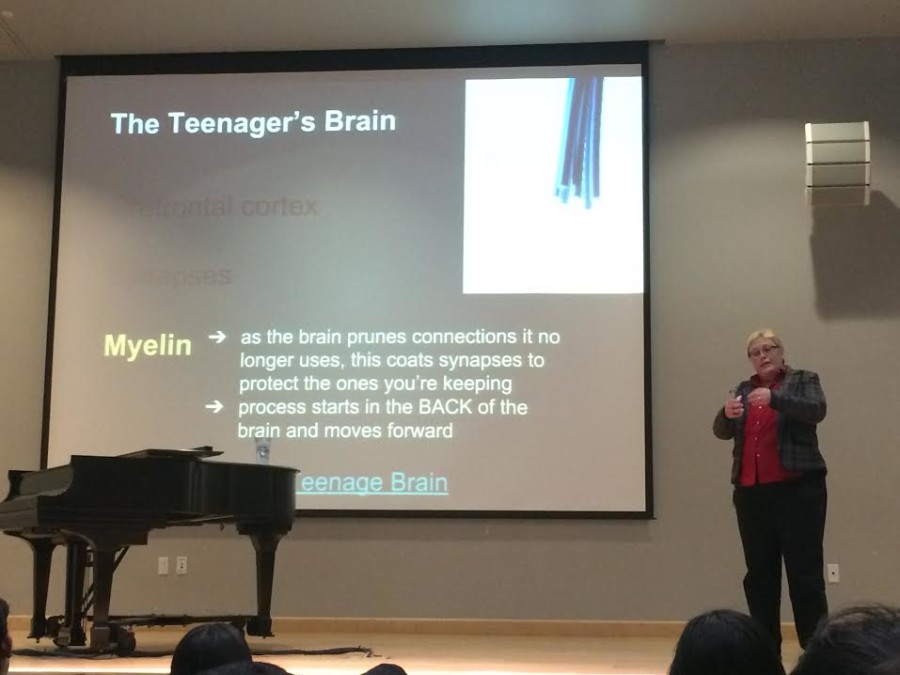Freshman learn about digital citizenship and online safety
Talking about the different parts of the teenage brain, Main teaches the freshman that some teenagers make bad decisions, because their brains are not fully developed yet.
Freshmen learned about the importance of online safety and digital citizenship presented by the Director of Learning Diane Main in the Nichols auditorium on Thursday.
Main touched upon many topics in her speech such as cyber bullying, sexting, social media, plagiarism and time management. She gave advice to the freshmen on how to balance a rigorous academic life while still enjoying the pleasures of social media.
At the beginning of the assembly, Main expressed that sometimes students in their early teen years make poor choices, such as cyber bullying.
“Think before you send or say something,” She said. “Is it true? Helpful? Inspiring? Necessary? Kind?”
She also explained how the number of teens who sext is getting higher and higher each year, adding to the mistakes that some teenagers make.
“You should never send a picture of yourself in a compromising position to anybody,” Main said. “It will likely be something that you will regret in the future.”
Periodically, Main would ask questions to the students in the audience. Although there was minimal participation, a few students answered questions.
One of the questions that she asked was about limiting distractions, and trying to avoid temptations from social media.
“I want to stay away from my siblings while working, Tyerinn Pollard (9) said. “They always tell me to check my phone to see something cool on social media, and then I get distracted for a while.”
Further explaining the do’s and don’ts of excessive social media distractions, Main said that you must limit screen time while completing school work, unless it is vital to whatever you are doing. For instance, turning off one’s phone is more effective than silencing it, to avoid the temptation of checking notifications. Same for a computer, if it is not in use, it should be shut off.
Also, she shared words regarding screen time.
“There should be at least one hour between screentime and sleep,” Main said. “This tells your mind that it’s time to sleep, and gives your eyes a rest.”

Jenna Sadhu (10) is a Social Media Reporter for the Winged Post and has been a part of the Harker community since Kindergarten. She plays on lacrosse,...


















![“[Building nerf blasters] became this outlet of creativity for me that hasn't been matched by anything else. The process [of] making a build complete to your desire is such a painstakingly difficult process, but I've had to learn from [the skills needed from] soldering to proper painting. There's so many different options for everything, if you think about it, it exists. The best part is [that] if it doesn't exist, you can build it yourself," Ishaan Parate said.](https://harkeraquila.com/wp-content/uploads/2022/08/DSC_8149-900x604.jpg)




![“When I came into high school, I was ready to be a follower. But DECA was a game changer for me. It helped me overcome my fear of public speaking, and it's played such a major role in who I've become today. To be able to successfully lead a chapter of 150 students, an officer team and be one of the upperclassmen I once really admired is something I'm [really] proud of,” Anvitha Tummala ('21) said.](https://harkeraquila.com/wp-content/uploads/2021/07/Screen-Shot-2021-07-25-at-9.50.05-AM-900x594.png)







![“I think getting up in the morning and having a sense of purpose [is exciting]. I think without a certain amount of drive, life is kind of obsolete and mundane, and I think having that every single day is what makes each day unique and kind of makes life exciting,” Neymika Jain (12) said.](https://harkeraquila.com/wp-content/uploads/2017/06/Screen-Shot-2017-06-03-at-4.54.16-PM.png)








![“My slogan is ‘slow feet, don’t eat, and I’m hungry.’ You need to run fast to get where you are–you aren't going to get those championships if you aren't fast,” Angel Cervantes (12) said. “I want to do well in school on my tests and in track and win championships for my team. I live by that, [and] I can do that anywhere: in the classroom or on the field.”](https://harkeraquila.com/wp-content/uploads/2018/06/DSC5146-900x601.jpg)
![“[Volleyball has] taught me how to fall correctly, and another thing it taught is that you don’t have to be the best at something to be good at it. If you just hit the ball in a smart way, then it still scores points and you’re good at it. You could be a background player and still make a much bigger impact on the team than you would think,” Anya Gert (’20) said.](https://harkeraquila.com/wp-content/uploads/2020/06/AnnaGert_JinTuan_HoHPhotoEdited-600x900.jpeg)

![“I'm not nearly there yet, but [my confidence has] definitely been getting better since I was pretty shy and timid coming into Harker my freshman year. I know that there's a lot of people that are really confident in what they do, and I really admire them. Everyone's so driven and that has really pushed me to kind of try to find my own place in high school and be more confident,” Alyssa Huang (’20) said.](https://harkeraquila.com/wp-content/uploads/2020/06/AlyssaHuang_EmilyChen_HoHPhoto-900x749.jpeg)



